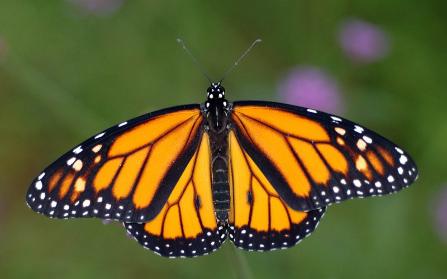Background on the Monarch Butteflies
Community Action Scholarship 2015-2016

Background on Monarch Butterflies:
- Monarch butterflies (Danaus plexippus) play a significant role in the health of local ecological systems. They provide food for other animals (spiders, birds, wasps) as well as pollinator services for native flowering plants.
- Monarchs also have one of the most unique migration patterns in the animal kingdom, using a combination of air and thermal currents to travel long distances from areas in the U.S. and Canada to Southern California and Mexico. Unlike other butterflies, they cannot survive the cold winters of northern climates and will migrate as far as 3,000 miles to reach their winter home. The monarch butterfly is the only butterfly that makes a two-way migration, similar to birds.
- Population data is recorded each year during the Fall migration. In 1996, 1 billion monarchs were estimated to have migrated south for the winter. Currently, there are less than 50 million monarchs remaining, representing just 5% of the 1996 population.
- More information about Monarch Butterflies
Monarchs & Milkweed:
- A close relationship exists between Monarchs and Milkweed (Asclepias spp.) plants. Monarchs utilize milkweed solely as a food source for their offspring and phytotoxins present in Milkweed accumulate within larvae and adult Monarchs, rendering them less desirable to predators.
- The use of agricultural pesticides discourages Milkweed from growing, and reduces the number of nesting sites and food sources for Monarchs. Since the mid-1990’s, large agri-businesses like Monsanto began using "Roundup Ready" seeds which were resilient to the Roundup herbicide. As farmers used large amounts of the herbicide, this changed the Midwest's ecology, causing a significant decline in Milkweed plants which had long thrived at the edges of cornfields.
- Since 1992, the presence of Milkweed in the U.S. has decreased by 80%, which has had a devastating effect on the population of Monarch butterflies.
Get Involved
If you are interested in either hosting a Milkweed Monarch Habitat or a Complimentary Educational workshop on Monarch Butterflies, please contact Marina for further information.
Marina Garcia
(224)-237-5193
To make a gift to the Community Action Scholarship Fund, follow this link and click “Direct Your Gift to Community Action Scholarship Fund.”


